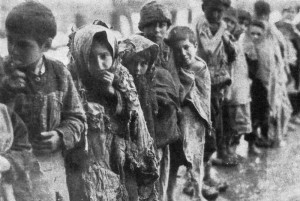Ever since the beginning of his papacy, Pope Francis has spoken out against the culture of “global indifference” that reigns in many of our societies. He has addressed the issue within the context of a wide variety of problems facing us today, for example the unspeakable drama of boat refugees crossing the Mediterranean and the untold numbers dying when trying to reach the shores of Europe in search of a better life. In his Lenten message the Holy Father commented:
As long as I am relatively healthy and comfortable, I don’t think about those less well off. Today, this selfish attitude of indifference has taken on global proportions, to the extent that we can speak of a globalization of indifference. It is a problem which we, as Christians, need to confront.
This is a problem we as Christians indeed must confront, because this indifference not only leads to loneliness and despair of those ignored, it also leads to new waves of violence coming out of our very own societies that claim to be peaceful, tolerant and democratic. The following example illustrates this point: the weekly newspaper “The Economist” reports in its April 18th-24th, 2015 issue that the top nine countries from which jihadists flow to Iraq and Syria are west European. What does this tell us about our Western societies? Despite the freedom and prosperity enjoyed by those in Europe, many thousands of young men and women from Europe are flocking eagerly to the Middle East to participate in ideologically inspired acts of hatred and brutal violence.
Why do these young men and women choose violence and death over a relatively comfortable life in prosperous Europe, where mainstream society promises them instant pleasure and material bliss with the latest smartphone and a cradle to grave social welfare state? Aside from the many useful explanations sociologists and politicians may give us about radicalization of certain youths, there is a much more profound cause at work here, which is the institutionalization of indifference towards the good, the true and the beautiful. When a society and its laws become dependent on mere feelings, opinions and preferences, rather than the pursuit of what is right and the avoidance of what is wrong, emptiness and desperation are the logical consequences.
This is the problem we Christians in Europe and other Western nations need to confront. We need to win back our youth for Christ, who is the way, the truth and the life. We cannot win young men and women back to Christ merely by doing good deeds, by being nice people, or by staying within the walls of our parishes and communities. It is important, but it is far too little. We need to go out, leave our comfort zones, and follow the Gospel call to “Go, therefore, and make disciples of all nations, baptizing them in the name of the Father, and of the Son, and of the Holy Spirit, teaching them to observe all that I have commanded you. And behold, I am with you always, until the end of the age.” (Matthew 28, 20). We need to speak about the love of God the Father, in private and in public, and we need to show and proclaim at every suitable occasion that living a life in Christ is good, and beautiful, and true – even if at times quite a challenge (but we all know that noting truly good and lasting comes easy). As Pope Francis says, we should not be afraid of being rejected but rather be assured that God’s love will redeem the world:
God is not indifferent to our world; he so loves it that he gave his Son for our salvation. In the Incarnation, in the earthly life, death, and resurrection of the Son of God, the gate between God and man, between heaven and earth, opens once for all. The Church is like the hand holding open this gate, thanks to her proclamation of God’s word, her celebration of the sacraments and her witness of the faith which works through love (cf. Gal 5:6). But the world tends to withdraw into itself and shut that door through which God comes into the world and the world comes to him. Hence the hand, which is the Church, must never be surprised if it is rejected, crushed and wounded.
He then concludes this thought by reminding us that “God’s people, then, need this interior renewal, lest we become indifferent and withdraw into ourselves”. When we Christians withdraw into ourselves and become indifferent to what happens in the world, we risk becoming silent bystanders of the many grave injustices that take place around us every day, near and far. Many courageous Christians are giving the example by their initiatives to spread the Gospel and do good around the world, others even by their martyrdom. But so much more witness is needed, especially to turn the ever growing tide of institutionalized indifference towards the sanctity of life; whether it be the life of the unborn, the elderly, the refugees or fellow human beings professing a different faith. Christ died on the Cross and rose from the dead out of love for every human being to be redeemed and to live.
The makers of this video show how radical Christ’s love – and thus ours – needs to be.
